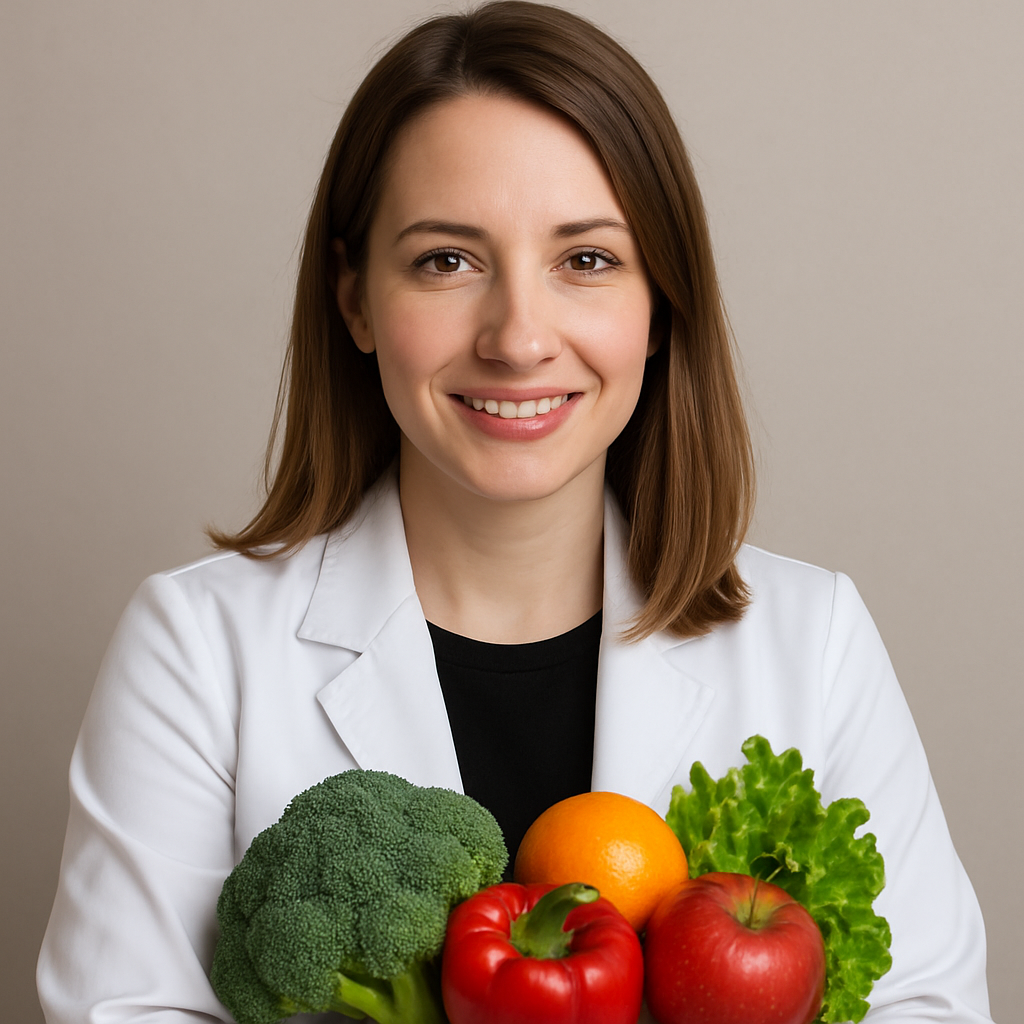We’ve All Been There…
Treat Acne Naturally: You’re getting ready for a big day—an interview, a date, or just a Monday—and you notice a red, inflamed pimple staring back at you in the mirror. Sound familiar? Whether it’s a single breakout or a chronic skin struggle, acne affects millions of people daily—impacting not only our appearance but also our confidence and quality of life. The truth? Acne is treatable. And you’re about to learn how.
Why You’ll Love This Guide:
- Backed by dermatologists and skin experts
- Actionable solutions using both medical and natural remedies
- Long-term prevention strategies that actually work
- Answers to the questions you’ve been Googling at 2 AM
- Warm, trustworthy advice rooted in clinical experience
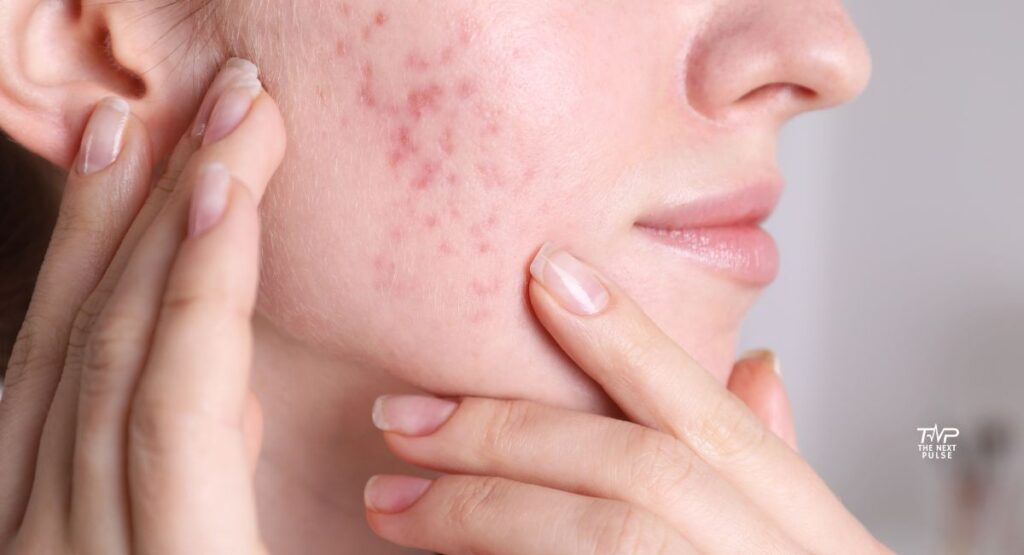
What Is Acne? Understanding the Root Problem
Acne is a common inflammatory skin condition that happens when hair follicles get clogged with oil (sebum), dead skin cells, and bacteria. This blockage leads to various types of lesions, ranging from mild blackheads to painful cysts.
How Acne Looks (Symptoms & Texture)
- Whiteheads – closed, clogged pores
- Blackheads – open pores filled with oxidized oil
- Papules – small, inflamed red bumps
- Pustules – similar to papules but with pus
- Nodules/Cysts – deep, painful lumps beneath the skin
Affected areas typically include:
- Face (forehead, cheeks, chin)
- Back
- Chest
- Shoulders
- Jawline (often hormonal)
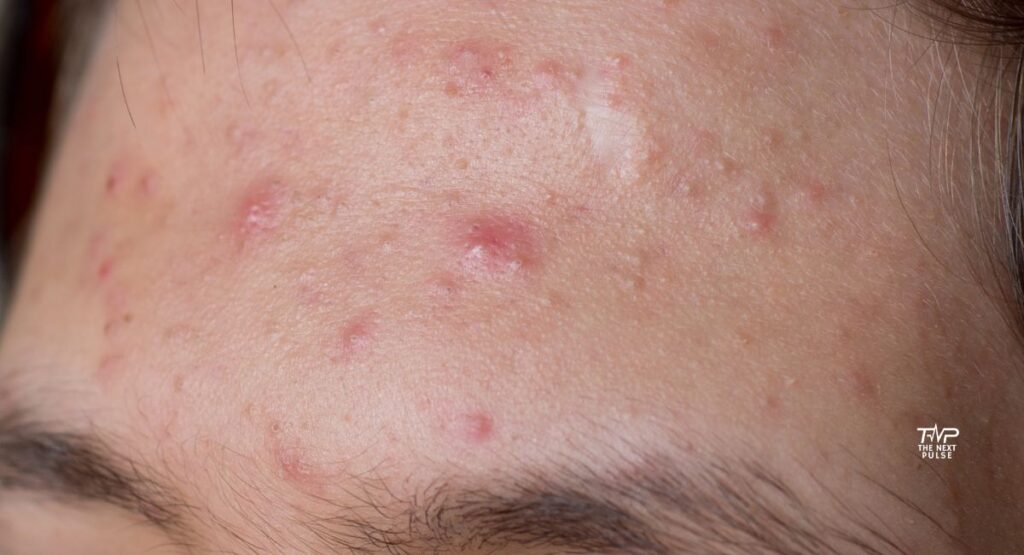
What Causes Acne? (Triggers You Should Know)
Acne isn’t caused by dirt. It’s a complex interplay of internal and external factors:
Internal Triggers
- Hormonal imbalances (puberty, PCOS, menstruation, stress)
- Genetics (if your parents had acne, you’re more likely to get it)
- Increased sebum production
External Triggers
- Heavy or comedogenic skincare products
- Sweat & friction (e.g., tight hats or helmets)
- Dirty pillowcases or phone screens
- High-sugar or dairy-rich diets
- Climate (humidity and sweat)
Dermatologist-Recommended Medical Treatments for Acne
Depending on severity, your dermatologist may recommend one or a combination of the following:
1.Topical Medications:
- Benzoyl Peroxide: Kills bacteria and reduces inflammation (OTC & Rx)
- Retinoids (Tretinoin, Adapalene): Promote cell turnover to prevent pore blockage
- Salicylic Acid: Exfoliates inside pores
- Azelaic Acid: Antibacterial, anti-inflammatory, and fades dark marks
2. Oral Medications:
- Antibiotics (Doxycycline, Minocycline): Reduce inflammation and bacteria
- Hormonal Therapy (Birth Control Pills, Spironolactone): Especially for women with hormonal acne
- Isotretinoin (Accutane): For severe, cystic acne; requires medical supervision
3. In-Clinic Procedures:
- Chemical Peels: Resurface the skin and reduce scarring
- Laser & Light Therapy: Target bacteria and pigmentation
- Cortisone Injections: Quickly reduce large cysts
Important: Medical treatments should be guided by a board-certified dermatologist. Overuse or incorrect combinations can worsen irritation.
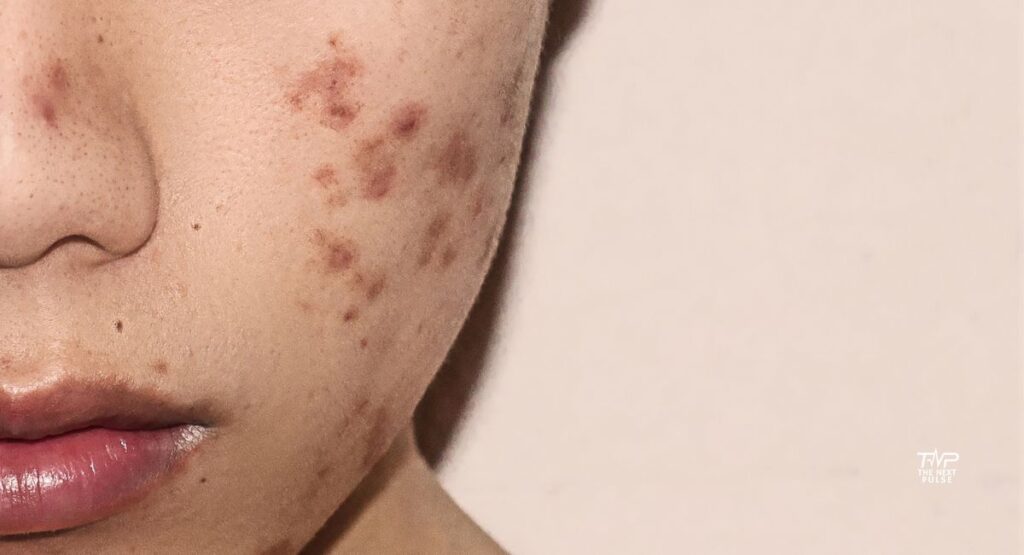
Natural & Home Remedies for Acne (That Actually Work)
Nature offers powerful tools to calm and heal the skin—if you use the right ingredients. These remedies are gentle yet effective when used consistently.
1. Green Tea Toner
- Why it works: Antioxidants reduce sebum and bacteria
- How to use: Steep green tea, cool, and apply with cotton pad daily
- Results timeline: 2–4 weeks
2. Raw Honey Spot Treatment
- Why it works: Natural antibacterial and soothing agent
- How to use: Dab on clean skin for 10–15 minutes, then rinse
- Results timeline: 1–2 weeks for visible calming
3. Tea Tree Oil
- Why it works: Proven antimicrobial
- How to use: Mix 1 part tea tree oil with 9 parts carrier oil (like jojoba); apply directly to pimples
- Results timeline: 1 week for active pimples
4. Aloe Vera Gel
- Why it works: Heals inflammation and speeds repair
- How to use: Apply pure aloe to skin after cleansing
- Results timeline: Ongoing calming and healing
⚠️ Always patch-test home remedies before full use.
Additional Tips to Prevent Acne (And Maintain Clear Skin)
Skincare Routine Adjustments:
- Use non-comedogenic products (labeled “won’t clog pores”)
- Avoid over-cleansing or over-exfoliating (2x/day max)
- Replace pillowcases weekly
- Avoid touching your face unnecessarily
Diet & Lifestyle:
- Cut back on dairy and high-glycemic foods (white bread, soda)
- Increase anti-inflammatory foods (omega-3s, leafy greens)
- Stay hydrated and manage stress with sleep, meditation, or exercise
💡 Pro Tip:
Use a dedicated towel just for your face. Bacteria from body towels can worsen breakouts. Wash it every 2–3 days for best hygiene.
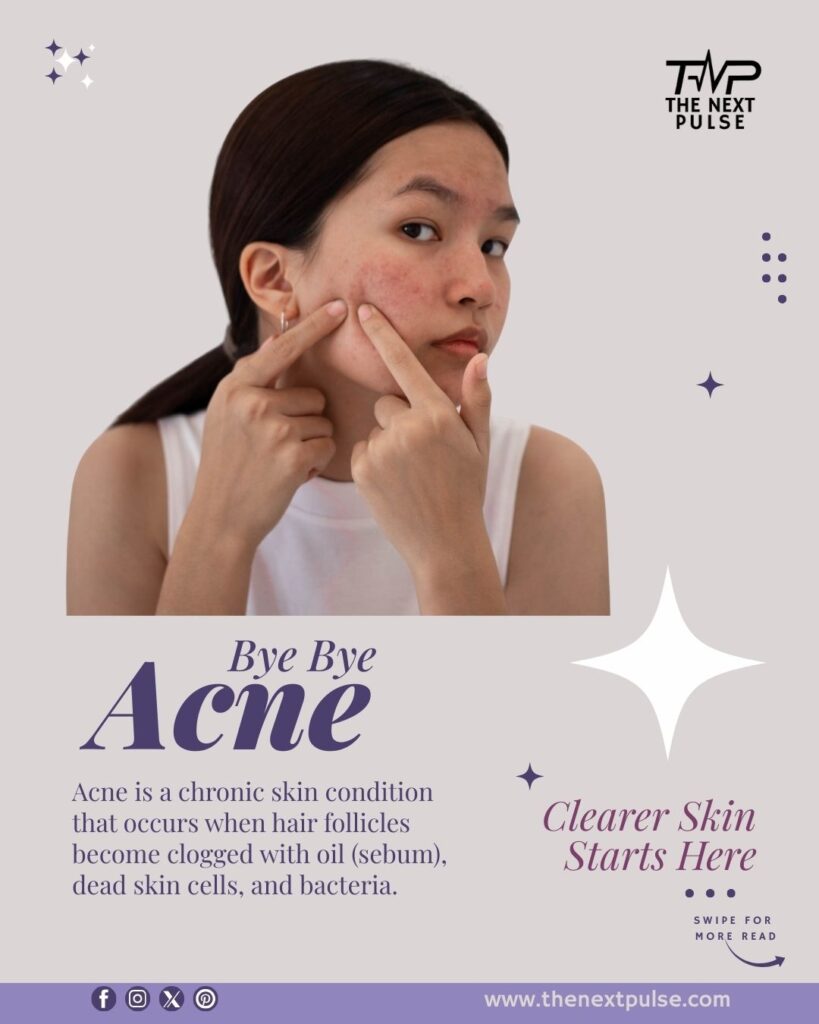
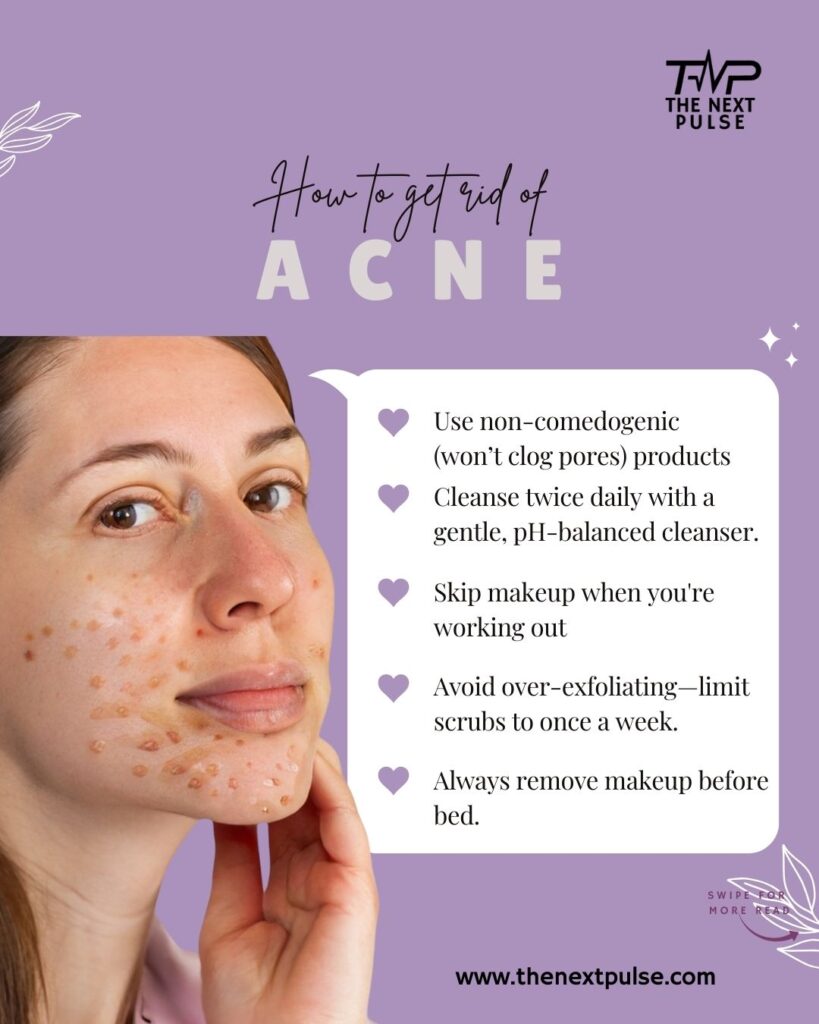
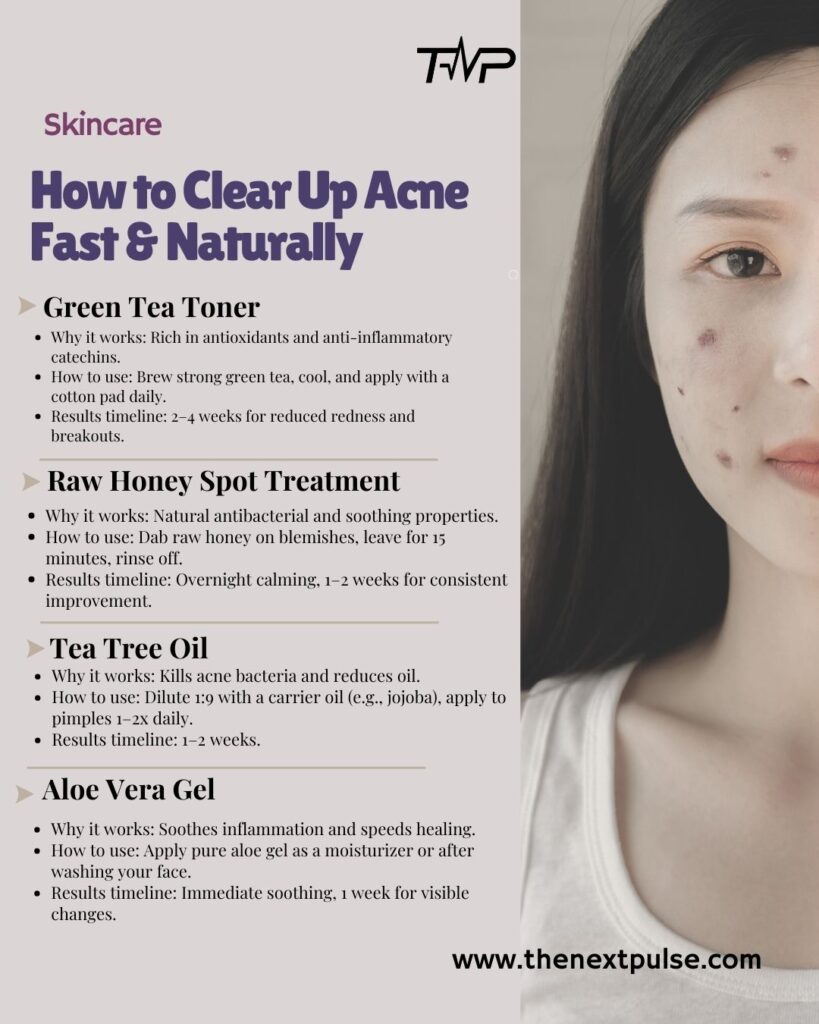
Frequently Asked Questions
1. Can stress cause acne?
Yes. Stress increases cortisol, which can spike oil production and inflammation.
2. Is acne only a teenage problem?
No—adult acne is extremely common, especially in women over 25.
3. Do greasy foods cause acne?
Not directly, but diets high in refined carbs and dairy may worsen breakouts.
4. How long before treatments work?
Expect visible improvement in 4–8 weeks. Some take longer—consistency is key.
5. Can acne scars go away?
Shallow scars may fade with time or topicals, but deep scars often need professional treatments like microneedling or lasers.
Final Thoughts: Clear Skin Is Possible
Acne might feel like a lifelong battle, but with the right information, tools, and habits, clear skin is achievable. Whether you opt for medical treatments or natural remedies, the key is consistency and personalization.
If you’re struggling with persistent or painful breakouts, don’t wait—consult a dermatologist. Early intervention prevents scarring and boosts long-term results.
